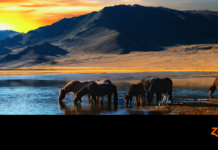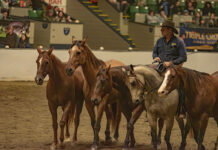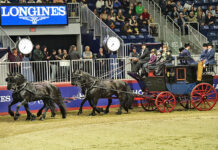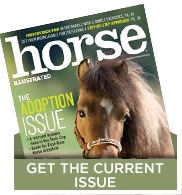 |
| Ponies are rounded up on the Virginia side of Assateague Island each year to help control the population and as a fundraiser for the Chincoteague Volunteer Fire Department. |
Viewing the annual Assateague Island pony swim is on the top of many horse lovers’ bucket lists thanks in large part to Marguerite Henry’s classic novel Misty of Chincoteague. Each year, the Chincoteague, Va. Volunteer Fire Department herds the Chincoteague Ponies from the island across the channel to the mainland where the younger ponies are auctioned off. This serves as population control and as a fundraiser for the department. This year’s swim took place on Wednesday.
Tourists visit the Assateague Island National Seashore throughout the year, hoping to catch a glimpse of the famous ponies. Many attempt to feed or pet the ponies, and over time, this has caused the ponies to become accustomed to humans, which is potentially dangerous for both people and ponies.
In response to the increasing interaction between ponies and people on the island, the National Park Service has tightened the rules for visitors. There has been a longstanding rule prohibiting people from touching the horses, but the rule has now been extended to mandate visitors stay at least 10 feet away from the ponies and to prohibit them doing anything to entice the ponies to come close to humans, such as offering them food.
Additionally, visitors now must lock away their food where ponies can’t access it instead of leaving it unattended in tents or at picnic areas. Ponies on the island have been known to invade campsites in search of tasty treats. This is not only dangerous for campers, but put ponies at risk of colic or other illness.
As horse owners know, feeding horses by hand can lead to undesirable behaviors, such as biting or pushing. This problem increases with feral equines that are completely untrained, but have become habituated to humans. Additionally, ponies have been reported to approach humans both on foot and in cars, increasing the risk of ponies wandering on to roadways.
Click here to read the National Park Service’s information on safely visiting Assateague Island and viewing the resident ponies.






BUT WOULDNT SOME HUMAN INTERACTION BE MORE BENEFICIAL TO THE PONIES, TO WHERE THEY WOULD BE A LITTLE LESS STRESSED AND AFRAID FOR WHEN THEY ARE AUCTIONED?? PLUS WOULDNT IT BE A LITTLE MORE SAFER ON THE PEOPLE WHO WILL BE TRYING TO BREAK/TRAIN THESE PONIES ONCE THEY ARE BACK HOME WITH THEM? I DONT KNOW, I GUESS THERE IS GOOD AND BAD FROM BOTH POINTS OF VIEW. I KNOW I WOULDNT WANT TO BREAK/TRAIN A FERAL PONY/HORSE. IN MY OPINION ITS ENOUGH OF A CHALLENGE AND TIME CONSUMING TO DO SO WITH ONE THATS DOMESTICATED.
I can see why those rules are set. Some people have no idea how to act around horses, especially feral horses. Now a days younger, more immature people would love to taunt and tease them. That could definitely make the ponies more pushy. I think it’s a good idea. Never the less, I would die to pet one, but getting them accustom to us could lead them to more busy areas and cause an accidnet. The horses are round up every year so the seasoned horses probably aren’t that stressed and they can help the younger horses stay calm. Sometimes rare beauties are best seen from afar.
Well, I know that if I were there I wouldn’t be able to resist trying to get one to come up close to me!
I guess that the problem is that people have this idea that wild ponies are like Disney animals.
Sure, you can tame and train a wild mustang, but it takes time, patience, and a sense of when to come into the pen and when to stay out. Taming any animal takes a lot of time, and it isn’t really done by walking into a pen where Mr. Completely Wild Horse lives, holding out an apple in your palm and waiting for the magical connection, (which comes in about two minutes, after a big show of flaring nostrils, dancing around, and snorting, followed by a perfectly tame, ridable (and guidable,) horse which loves you and would lay down its life to save you. That’s just not how it works. People have to realise that and leave taming wild horses to the experts. I think that it is good that those rules have been put up, (even though I admit that I WOULD like to tame a Chincotegue. I’ve read Misty too.